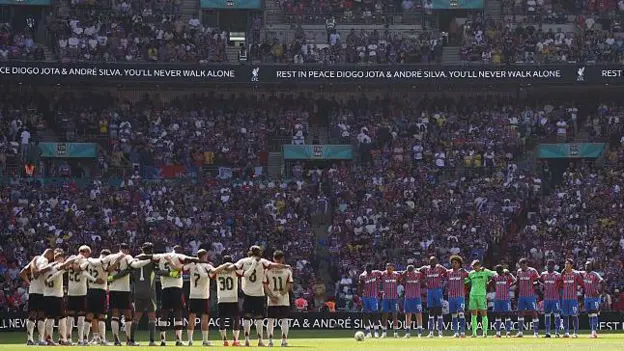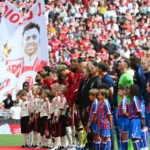Fans disrupting Jota silence had ‘no bad intention’

The 2025 Community Shield will be remembered not just for Crystal Palace’s historic first triumph in the competition, but for a moment that tested the boundaries of football etiquette and human understanding. When referee Chris Kavanagh made the difficult decision to cut short a minute’s silence dedicated to the memory of former Liverpool forward Diogo Jota and his brother Andre Silva, who tragically died in a car crash in northern Spain last month, it sparked immediate controversy and debate across the football community.
However, Liverpool manager Arne Slot’s measured response in the aftermath of his team’s 3-2 penalty defeat has provided a masterclass in leadership, empathy, and the kind of mature perspective that football often desperately needs. Rather than allowing the incident to overshadow either the memory of the deceased or the significance of the match, Slot chose a path of understanding that speaks volumes about his character and his approach to managing not just a football team, but the emotions and expectations of an entire fanbase.
The scene at Wembley Stadium was set for what should have been a poignant and respectful tribute. Nearly 90,000 fans had gathered for the traditional season curtain-raiser, with Liverpool supporters traveling in their thousands to honor not just their team’s participation in the Community Shield, but to pay their respects to Jota, who had become a beloved figure during his five seasons at Anfield. The Portuguese forward, who wore the number 20 shirt with distinction, had tragically lost his life alongside his younger brother Andre Silva, aged just 25, in circumstances that shocked the football world.
As the stadium fell silent, the weight of the moment was palpable. This was more than just a sporting tradition; it was a community coming together to remember two young lives cut tragically short. The east end of Wembley, where Crystal Palace supporters were congregated, initially joined in the respectful silence. However, as seconds ticked by, the quiet was pierced by what appeared to be celebratory shouts from a small section of the away support.
The disruption was immediate and jarring. What had begun as a moment of collective mourning quickly transformed into confusion and tension. The Palace supporters around the source of the noise could be heard attempting to quiet their fellow fans, but their shushing and urgent whispers only added to the audible disruption. Liverpool fans, already emotionally charged by the tribute to their former player, began to react with their own vocal disapproval, creating a cascade of noise that ultimately forced referee Chris Kavanagh to make the decision to end the silence prematurely.
In the immediate aftermath of Liverpool’s defeat, Arne Slot faced a barrage of questions about the incident. The Dutch manager, in just his first competitive match in charge of the Reds, could have easily taken the opportunity to criticize Palace supporters or use the disruption as an excuse for his team’s performance. Instead, he demonstrated the kind of thoughtful leadership that suggests Liverpool made the right choice in appointing him as Jürgen Klopp’s successor.
“I don’t think this was planned, or that this was the idea of the fan that made some noise,” Slot explained to gathered media, his tone measured and diplomatic. “Maybe he wasn’t aware of the fact that it was the minute of silence. He was just still happy and tried to cheer for his team. And I think then the fans of Palace were trying to calm that person or those persons down, so I don’t think he had a bad intention, the guy or people that made noise.”
This response reveals several important aspects of Slot’s character and managerial philosophy. First, his willingness to give the benefit of the doubt to opposition supporters demonstrates a mature understanding that football fans are human beings capable of mistakes, not enemies to be demonized. Second, his recognition that other Palace supporters attempted to quiet the disruptive fans shows an appreciation for the majority who were trying to do the right thing. Finally, his acknowledgment that emotions run high in football and that genuine mistakes can occur reveals a manager who understands the complex psychology of sport and its supporters.
Slot continued his explanation with even more nuanced thinking: “They tried to calm him down, but that was a bit noisy as well. And then our fans reacted, ‘Hey, what’s happening here?’ So I don’t think there’s a bad intention to it, because the fans of Crystal Palace and everywhere around the world have paid huge respect to Diogo and Andre and this was I think unlucky or, I can’t find the right words, but I don’t think there was a bad intention in it.”
The manager’s admission that he couldn’t find the right words is perhaps the most human moment of his entire response. It acknowledges that some situations transcend simple explanations and that the complexity of human emotions and reactions in charged situations cannot always be neatly categorized or easily understood.
The incident at Wembley highlights the complex relationship between football culture and expressions of grief and remembrance. Football stadiums are spaces of intense emotion, where passion, loyalty, and tribal identity are expressed in their rawest forms. The minute’s silence, as a tradition borrowed from military remembrance practices, asks thousands of emotionally charged individuals to suddenly suppress those very instincts that brought them to the stadium in the first place.
This is not to excuse disrespectful behavior, but rather to acknowledge the challenging nature of the request. When Crystal Palace supporters arrived at Wembley, many were likely experiencing the highest emotions of their football-supporting lives. Their team, traditionally considered one of the smaller clubs in the Premier League, had qualified for the Community Shield for the first time in their history by winning the FA Cup. The excitement, anticipation, and pride they felt would have been overwhelming for many fans who had waited decades to see their team reach such heights.
Into this cauldron of celebration and expectation came the request for absolute silence to honor the memory of an opposition player. While the vast majority of football supporters understand and respect such traditions, it requires a level of emotional discipline and situational awareness that not every individual possesses, particularly in moments of peak excitement or when alcohol may have been consumed.
Slot’s understanding of this human complexity is what separates his response from the typical knee-jerk reactions that often follow such incidents. Rather than condemning an entire fanbase or using the moment to score political points, he chose to see the situation through the lens of human fallibility and genuine mistake rather than malicious intent.
The timing of Jota’s death, coming just five weeks before the Community Shield, added another layer of complexity to the tribute. As Slot noted, “It’s also five weeks ago, so that’s why maybe this fan who was just so happy for them to be in the Community Shield that he forgot in a second.” This observation touches on one of the most difficult aspects of public grief – the expectation that tragedy should remain fresh and present in the minds of everyone, even those who had no personal connection to the deceased.
For Liverpool supporters, the loss of Jota represented a deeply personal tragedy. The Portuguese forward had become more than just a player during his time at Anfield; he had become a symbol of the club’s values, work ethic, and connection to its supporters. His death, along with that of his brother, had sent shockwaves through the Liverpool community that were still reverberating weeks later. The pain was real, immediate, and ongoing.
For Crystal Palace supporters, however, the tragedy, while acknowledged and respected, was necessarily more distant. Their emotional focus was understandably on their own historic achievement and the excitement of their team’s first Community Shield appearance. This difference in emotional investment and proximity to the tragedy doesn’t make the Palace fans callous or disrespectful; it simply makes them human.
Slot’s recognition of this difference in perspective shows a manager who understands that grief and memory exist on different timelines for different people. His comment about looking forward to seeing “how respectful that is going to happen” when Bournemouth visit Anfield suggests he understands that home crowds, with their deeper emotional connection to the honored individuals, may find it easier to maintain the solemnity such occasions require.
Perhaps the most remarkable aspect of the entire Community Shield experience was the goal scored by Liverpool’s Jeremie Frimpong. The timing of the goal – 20 minutes and 20 seconds – exactly matched Jota’s shirt number, creating a moment that transcended the usual boundaries between sport and spirituality. TNT Sports commentator Darren Fletcher’s reaction captured the surreal nature of the moment: “It is incredible. Some things are just mean to be. It is unbelievable isn’t it? You just have to look about. There are a lot of stunned people at the moment.”
This coincidence, if it can be called that, provided a different kind of tribute to Jota’s memory than the planned minute’s silence. Where the formal tribute was disrupted by human imperfection and the complexity of crowd dynamics, this spontaneous moment felt divinely ordained. It offered a form of closure and meaning that no amount of planning could have achieved.
The goal also demonstrated football’s unique ability to create narrative meaning from seemingly random events. In any other context, the timing of a goal would be merely statistical information. Within the emotional framework of a tribute match, however, it became a sign, a message, a moment of connection between the living and the dead that provided comfort to those still grieving.
Liverpool’s decision to retire the number 20 shirt following Jota’s death had already established the significance of that number in the club’s collective memory. Frimpong’s goal at exactly 20:20 transformed what could have been seen as a meaningless numerical coincidence into something approaching the sacred in football terms.
Crystal Palace’s eventual victory on penalties added another layer of complexity to the emotional narrative of the match. Dean Henderson’s heroics, saving two penalties to secure his team’s first Community Shield triumph, meant that the match would be remembered primarily for Palace’s historic achievement rather than the tribute that had begun it.
This outcome presentedan interesting challenge to how the match would be remembered and discussed. Would the focus be on Palace’s celebration of their first major silverware, Liverpool’s tribute to their fallen player, or the controversial disruption of the minute’s silence? In many ways, Slot’s generous and understanding response helped ensure that the story would be told with nuance rather than sensationalism.
The manager’s approach suggested that multiple narratives could coexist without diminishing each other. Palace could celebrate their historic achievement, Liverpool could honor their former player’s memory, and the football community could learn from a moment of human imperfection without turning it into a source of lasting division or bitterness.
Before addressing the disrupted silence, it’s worth acknowledging the aspects of the tribute that went exactly as planned. The laying of wreaths by Liverpool’s record goalscorer Ian Rush, Palace chairman Steve Parish, and Football Association chair Debbie Hewitt represented the football community at its most respectful and unified. These gestures, carried out at the Liverpool end of Wembley, demonstrated that the sport’s governing bodies and key figures understood the significance of the moment and were committed to honoring it appropriately.
The fans’ rendition of “You’ll Never Walk Alone,” Liverpool’s anthem that has transcended football to become a universal song of solidarity and support, provided the kind of emotional release and communal expression that formal silences sometimes cannot achieve. The song, with its themes of hope persisting through darkness and the promise of mutual support through difficult times, offered a more natural and culturally appropriate way for supporters to express their feelings about loss and memory.
This contrast between the disrupted silence and the successful singing highlights an important point about football culture and its relationship with formal and informal expressions of emotion. While minute’s silences serve an important function and should be respected, football supporters often find their most authentic voice through songs, chants, and other forms of vocal expression that are native to the stadium environment.
Slot’s handling of the incident offers several lessons for how football might approach similar situations in the future. His emphasis on understanding rather than condemnation, his recognition of human complexity rather than demanding perfection, and his focus on intent rather than outcome provide a template for how the sport can maintain its traditions of respect while acknowledging the realities of human nature.
His comment about looking forward to the tribute at Anfield when Bournemouth visit also suggests an understanding that different contexts require different approaches. A home crowd, with deeper emotional investment in the honored individual, may be better positioned to maintain the solemnity that such occasions require. This doesn’t mean that away crowds are inherently less respectful, but rather that the emotional dynamics of different situations need to be considered when planning such tributes.
The manager’s approach also demonstrates the importance of leadership in shaping how controversial incidents are remembered and discussed. By choosing understanding over condemnation, Slot helped ensure that the incident would be remembered as a moment of human complexity rather than a source of lasting division between fan bases
The way this incident was handled by Slot, and subsequently discussed by the media and fan communities, may have broader implications for football culture’s relationship with controversy and criticism. In an era where social media often amplifies outrage and demands immediate, decisive judgment, Slot’s measured response offers an alternative model.
His approach suggests that football leaders have the power to shape narratives in more constructive directions by choosing empathy over anger, understanding over condemnation, and complexity over simplification. This doesn’t mean excusing genuinely disrespectful behavior, but rather creating space for human imperfection and the recognition that good intentions can sometimes lead to unfortunate outcomes.
The incident also highlights the ongoing challenge of maintaining football’s traditions of respect and remembrance in an era of intensified emotions, increased media scrutiny, and social media amplification of every controversial moment. Finding ways to honor the past while acknowledging present realities requires the kind of nuanced thinking that Slot demonstrated in his response.
The 2025 Community Shield will ultimately be remembered for Crystal Palace’s historic triumph, but the subplot of the disrupted minute’s silence and Arne Slot’s response may prove equally significant in the long term. By choosing understanding over condemnation, by recognizing human complexity rather than demanding perfection, and by focusing on intent rather than outcome, the Liverpool manager provided a masterclass in leadership that transcended football.
His response demonstrated that it is possible to honor the memory of the deceased, acknowledge the disappointment of the disrupted tribute, and still extend compassion to those who made mistakes. In doing so, he showed that football at its best can be a force for bringing people together rather than driving them apart, even in moments of controversy and high emotion.
The coincidence of Frimpong’s goal at 20:20, wearing Jota’s retired number, provided a different kind of tribute – one that felt organic rather than planned, mystical rather than formal. Perhaps this serves as a reminder that the most meaningful tributes often come not from perfect execution of planned ceremonies, but from the unexpected moments when sport transcends its earthly boundaries and touches something deeper in the















